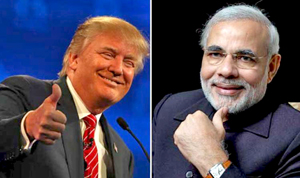Delhi, Jun 13: Prime Minister Narendra Modi will be in the United States on 25th and 26th of June this year on the invitation on President Donald Trump.
He will be holding talks with US President on June 26.
This will be the first meeting between the two leaders.
However, they have spoken to each other over phone three times since Trump's inauguration in January this year.
PM Modi last visited US in June 2016 at the invitation of the then US president Barack Obama.
He had also addressed a joint sitting of the US Congress.
Confirming PM Modi's upcoming US visit, the Indian Embassy tweeted the following:
Press Release-PM @narendramodi to visit US at the invitation of @POTUS on 25-26 June. @SushmaSwaraj pic.twitter.com/rrACUcPbNU
— India in USA (@IndianEmbassyUS) June 12, 2017
In November last year, PM Modi had congratulated Trump on being elected as US President and had said that he was looking forward to working with him closely to take Indo-US ties to a new height.
"Congratulations on being elected as the 45th US President," he had said in a tweet.
PM Modi had added that the country was looking forward to working closely with Trump to strengthen bilateral ties.
"We look forward to working with you closely to take India-US bilateral ties to a new height. We appreciate the friendship you have articulated towards India during your campaign," PM Modi had further said.
Responding to the greetings, Trump had at that time extended invitation to the PM to visit the United States.
An official statement from Washington had said that Trump saw India as a "true friend and partner in addressing challenges around the world".
"The two discussed opportunities to strengthen the partnership between the US and India in broad areas such as the economy and defence," it had added.
The US statement had maintained that Trump and PM Modi had resolved to "stand shoulder to shoulder in the global fight against terrorism".
Trump beat seasoned politician Hillary Clinton in the knife-edge polls, defying the odds to become the 45th US President.





Comments
Add new comment